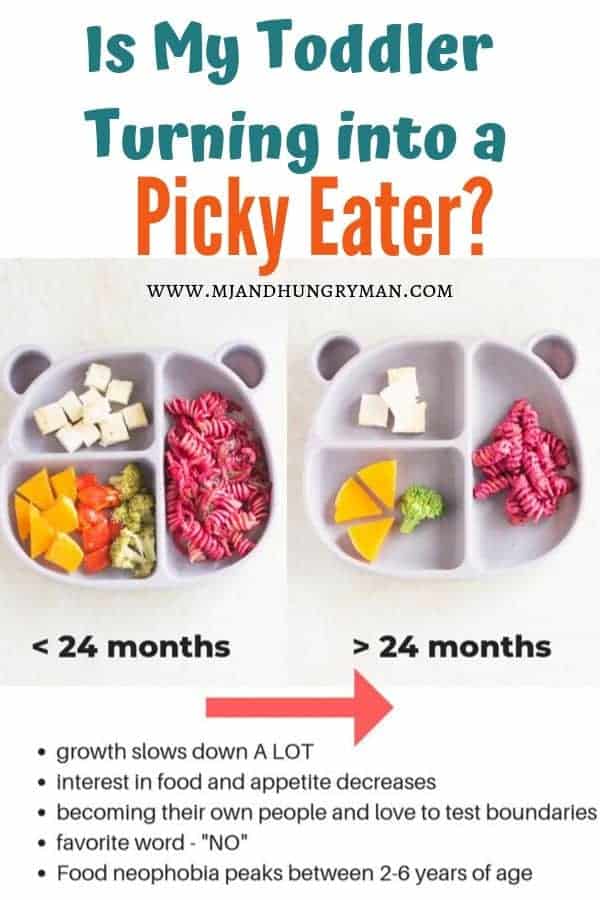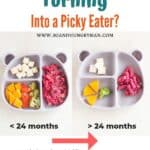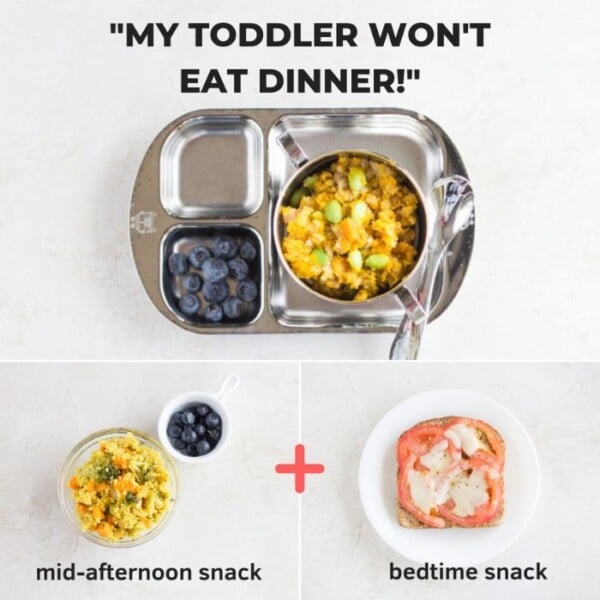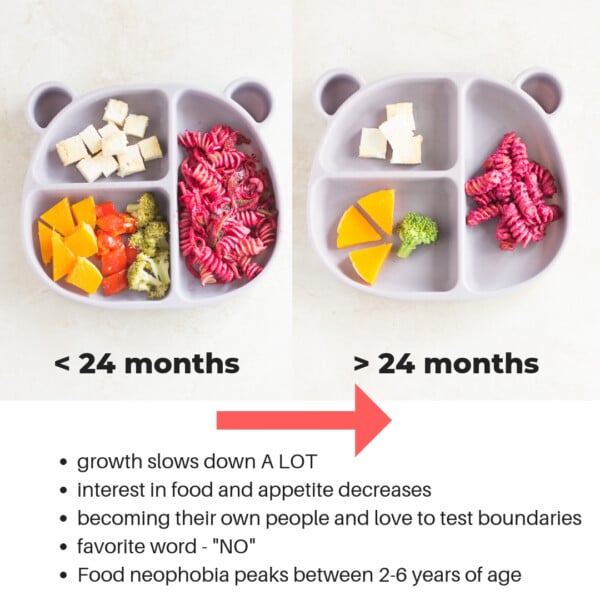This post may contain affiliate links. Please see our disclosure policy for more details.
Your baby was a champion eater and ate just about anything that was placed in front of her. And then she became a toddler. Does this sound familiar? If so, read on!
When our children aren’t eating well, it’s easy to blame ourselves or the child. However, it’s really important that we consider and understand the children’s developmental stages. The biggest change that happens during the second year is the drastic slowing down of growth.
During the first year, babies triple their birth weights, while during toddlerhood, average weight gain is around 4.5-6.5 pounds. And because they’re not growing as fast, they tend to have poorer appetite.
I think it’s so amazing that they have this innate ability to self-regulate and that when left to themselves, they’ll eat as much as they need for growth and energy.
Not only that, research shows that generally, babies are most willing to try new foods and enjoy them. This is why it’s so important to expose your baby to as many flavors and textures as possible during what’s oftentimes referred to as the “window of opportunity” or the “honeymoon period.”
As they grow older, they become more timid in trying new foods. There’s a term for this, and it’s called food neophobia, which peaks around 2-6 years of age.

My son actually ate the most between 1-2 years of age. I served the meal on the left when he was 17 months and he literally ate everything. It was mind-blowing how much he was able to put down. As a fun experiment, I served him the exact same meal at 25 months & you can see the difference. Granted his appetite fluctuates (also normal!) and on any given day he could eat much more or less.
But that’s just it! We absolutely do not have control over our children’s eating. THEY ARE. That’s probably the biggest and hardest lesson I had to learn in regards to feeding.
So if you’re noticing changes in your toddler’s eating, before being quick to say that your child is turning into a picky eater & perhaps feeling like you failed or did something wrong, hear this. It’s NOT your fault! As parents, we want to fix everything & make things “right.” But when it comes to feeding, the less we get involved, the better!
Rather than focusing on what your toddler is/isn’t eating and thinking “how can I get my child to eat xyz”
- Reframe your mindset of “getting” them to eat anything. That is not our job.
- Our job is to continue offering a wide variety of nutritious foods & allowing our children to decide how much food to eat (or not).
- TRUST your child’s innate ability to self-regulate. They will eat as much as they need. I can’t emphasize this enough. Your child’s appetite will improve as they grow older and when their body tells them to eat more!
- No pressure. No bribes. Remain calm and pleasant. Yup, I admit. I’ve said “one more bite” and lost my cool on many occasions despite knowing not to. And that never ended well for us. Force feeding may actually decrease appetite. Perhaps your child might listen, but in the long run, may cause more harm than good.
- Kids’ tastes and preferences are constantly evolving. Don’t stop serving and cater to their wishes. They may decide that they don’t want to have anything to do with broccoli now. Come 2-3 months later, they might love it. Here are some tips to encourage your child to eat their vegetables.
- Keep role modeling! This is SO powerful! Actions speak louder than words.
- Enjoy mealtimes as a family and create lots of memories around the table. I always think about how days are long but years even shorter.
- Your child won’t starve. Really! And as long as your child is growing normally and has good energy level, there’s no need to worry. Easier said than none, this I know. I hope reading this post – Help! My Toddler Won’t Eat! – will give you some peace of mind!
- Set a daily eating schedule. Our little ones thrive on structure and predictability. I’ve included some of our schedules here.
- Keep the big picture/goal in mind and don’t sweat the small stuff. Mine = I want to raise a child who is in tune with & respects his inner hunger and fullness cues & develops a healthy relationship with food
To Sum:
First, know that the ever-so-unpredictable fluctuations in your toddler’s eating from meal to meal and day to day is a NORMAL part of development. Hopefully, knowing that will:
- help ease your worries when your child eats very little or rejects a meal all together.
- help shift your mindset from how can I “get” my child to eat to how can I encourage my child to eat better by practicing responsive feeding and focusing on creating structure and a safe and positive eating environment.
I do want to mention that prolonged food refusal may indicate a more serious feeding problem in which case you’d want to consult with your healthcare provider.















we saw a huge change on our daughter’s eating habits at 2-3 years old. there sense of smell develops drastically sometime in that window and stuff that was previously inoffensive is suddenly different and can be tasted on a totally different level! good luck.
So true! Thanks for sharing!